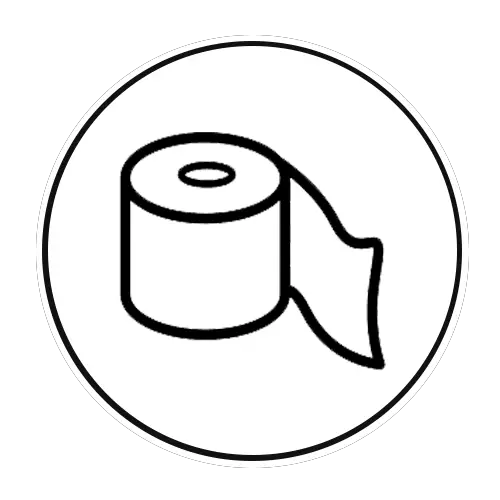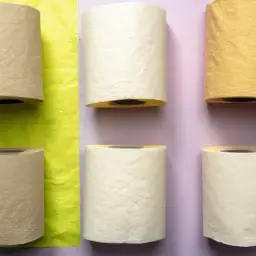Hey there!
Looking for some eco-friendly alternatives to traditional toilet paper? Well, you’re in luck! I’ve got a list of 12 refreshing options that will help reduce your carbon footprint while keeping you clean and comfortable.
From recycled paper products to innovative materials like corn husk and seaweed, there’s something for everyone.
So, say goodbye to wasteful practices and join me on this journey towards a greener bathroom experience. Let’s dive in!
Recycled Paper Products
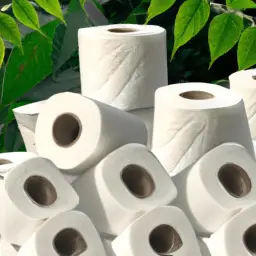
I’ve found three excellent recycled paper products that are both environmentally-friendly and high-quality.
When it comes to choosing paper products, opting for recycled options has numerous benefits. Not only does it reduce the demand for virgin materials, but it also helps in conserving natural resources and reducing energy consumption. Recycled paper production involves collecting and processing waste paper, which reduces the amount of waste sent to landfills and minimizes the need for deforestation.
One of the recycled paper products I discovered is eco-friendly toilet paper. Made from 100% recycled fibers, it offers the same softness and strength as traditional toilet paper while reducing the carbon footprint.
Another great find is recycled paper towels. These absorbent and durable towels are made from post-consumer waste, making them an excellent choice for those who want to minimize their impact on the environment.
Lastly, recycled paper napkins are an essential addition to any eco-conscious household. These napkins are made from recycled paper fibers, which means fewer trees are cut down to produce them. They aren’t only gentle on the planet but also soft and absorbent for everyday use.
Bidets and Bidet Attachments

There are many options for bidets and bidet attachments that offer a more environmentally-friendly alternative to traditional toilet paper. Bidets have been around for centuries and are commonly used in many countries around the world. They’re fixtures that are installed in the bathroom and are designed to clean your bottom using water instead of toilet paper.
One of the main benefits of using a bidet is that it reduces the amount of toilet paper that’s used, which is great for the environment. According to studies, the average person uses about 57 sheets of toilet paper per day. By using a bidet, you can significantly reduce this number and save trees in the process.
Installing a bidet can be done in a few different ways. You can choose to install a standalone bidet, which is a separate fixture next to the toilet. This option requires more space and can be more expensive. Alternatively, you can opt for a bidet attachment that can be installed on your existing toilet. These attachments are more affordable and easier to install.
Reusable Cloth Wipes
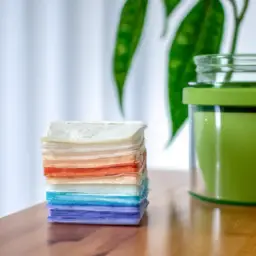
Reusable cloth wipes provide a sustainable and cost-effective option for reducing waste in the bathroom. When it comes to toilet paper alternatives, DIY cloth wipes offer numerous benefits. Not only do they help minimize the amount of waste produced, but they also save money in the long run. By making your own cloth wipes, you have control over the materials used, allowing you to choose natural, organic fabrics that are gentle on the skin and environmentally friendly.
The benefits of reusable toilet paper extend beyond waste reduction. Cloth wipes are often softer and more comfortable than traditional toilet paper, providing a luxurious feel. They can also be easily washed and reused, making them a hygienic option. Additionally, cloth wipes can be customized to suit personal preferences, whether it’s the size, thickness, or pattern.
To make DIY cloth wipes, all you need is some fabric, scissors, and a sewing machine. Cut the fabric into squares or rectangles, stitch the edges to prevent fraying, and you’re ready to go. It’s a simple and fun project that allows you to take a step towards a more sustainable lifestyle.
Corn Husk Toilet Paper
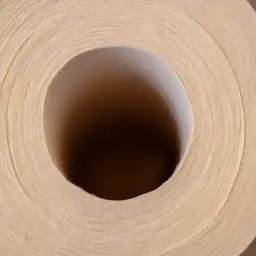
Can corn husk be used as an environmentally-friendly alternative to traditional toilet paper? When it comes to sustainable bathroom products and toilet paper alternatives, corn husk is an option worth considering. Corn husk is the outer covering of corn, which is usually discarded after the corn kernels are removed. However, this natural material can be repurposed to create toilet paper that is both eco-friendly and effective.
To give you a better understanding of the benefits and drawbacks of corn husk toilet paper, here’s a comparison table:
| Corn Husk Toilet Paper | Traditional Toilet Paper |
|---|---|
| Made from renewable and biodegradable material | Made from trees, contributing to deforestation |
| Chemical-free and hypoallergenic | May contain chemicals and fragrances that can irritate the skin |
| Soft and gentle texture | Can be rough and abrasive |
| Dissolves quickly in water, reducing the risk of clogging | May cause plumbing problems if not easily dissolved |
| Generally more expensive | Usually more affordable |
While corn husk toilet paper may be a bit pricier and not as widely available as traditional toilet paper, it offers a greener alternative that can help reduce our environmental impact. By opting for sustainable bathroom products like corn husk toilet paper, we can make a positive change without compromising on quality or comfort.
Hemp Toilet Paper
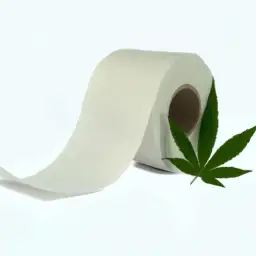
I discovered that hemp toilet paper is a sustainable and eco-friendly option for those looking for an alternative to traditional toilet paper. Hemp production offers numerous sustainability benefits that make it an attractive choice for environmentally-conscious individuals.
Hemp is a fast-growing crop that requires minimal water and no pesticides or herbicides to thrive. This makes it a more sustainable option compared to traditional toilet paper made from trees. Additionally, hemp plants have deep roots that help prevent soil erosion and improve soil health.
The production of hemp toilet paper also has a lower carbon footprint compared to traditional toilet paper. Hemp plants absorb large amounts of carbon dioxide from the atmosphere while they grow, helping to reduce greenhouse gas emissions.
Furthermore, hemp toilet paper is biodegradable and can be recycled, reducing waste and the strain on landfills. It’s also naturally soft and hypoallergenic, making it gentle on the skin.
Coconut Husk Toilet Paper
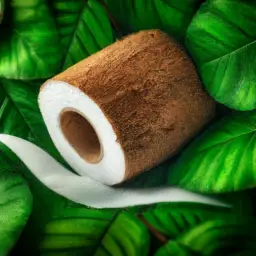
When considering environmentally-friendly toilet paper options, one option to explore is coconut husk toilet paper. Made from the fibrous outer shell of the coconut, this alternative offers a sustainable and compostable solution for personal hygiene needs.
The production process of coconut husk toilet paper involves several steps. First, the husks are collected and dried to remove moisture. Then, they are mechanically processed to extract the fibers, which are then cleaned and bleached using eco-friendly methods. These fibers are then formed into toilet paper rolls, ready for use.
One of the key benefits of coconut husk toilet paper is its composting benefits. As it is made from a natural material, it can be easily broken down and returned to the earth. When composted, the fibers from coconut husk toilet paper add valuable nutrients to the soil, enriching it and promoting healthy plant growth. This makes it an excellent choice for those who are conscious about reducing waste and minimizing their environmental impact.
To illustrate the advantages of coconut husk toilet paper, here is a comparison table:
| Coconut Husk Toilet Paper | Traditional Toilet Paper |
|---|---|
| Made from natural fibers | Made from trees |
| Compostable | Non-compostable |
| Sustainable production | Resource-intensive |
| Chemical-free bleaching | Chemical bleaching |
Wheat Straw Toilet Paper
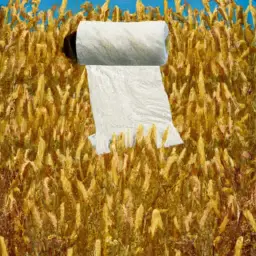
One alternative to explore for environmentally-friendly toilet paper is wheat straw toilet paper. Wheat straw toilet paper is made from the leftover stalks of wheat plants after the grain has been harvested. This means that it utilizes a waste product that would otherwise be discarded.
One of the benefits of wheat straw toilet paper is that it often comes in compostable packaging. This means that not only is the toilet paper itself more sustainable, but the packaging it comes in is as well. Compostable packaging can be broken down and turned into nutrient-rich compost, reducing waste and environmental impact.
In addition to compostable packaging, many brands that produce wheat straw toilet paper also have sustainability certifications. These certifications ensure that the toilet paper meets certain environmental standards, such as being made from renewable resources and using less water and energy in the manufacturing process. By choosing toilet paper with sustainability certifications, consumers can be confident that they’re making a more eco-friendly choice.
Mulberry Bark Toilet Paper
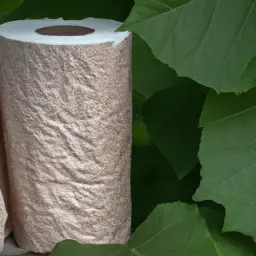
Another alternative worth considering is mulberry bark toilet paper, as it offers an eco-friendly option for those concerned about the environment. Mulberry bark, derived from the mulberry tree, has several benefits that make it a viable alternative to traditional toilet paper. Firstly, mulberry bark is a renewable resource, as the trees can be harvested multiple times throughout their lifespan. This reduces the strain on other natural resources and helps to preserve forests. Additionally, mulberry bark is naturally antibacterial and hypoallergenic, making it gentle and safe for sensitive skin.
The production process of mulberry bark toilet paper involves harvesting the bark from the mulberry trees and processing it into thin sheets. The bark is carefully stripped off the trees without causing any harm, allowing the trees to continue growing and providing a sustainable source of raw material. The sheets are then processed and transformed into soft, durable toilet paper that is comparable in quality to traditional options.
To further illustrate the benefits of mulberry bark toilet paper, consider the following table:
| Benefits of Mulberry Bark Toilet Paper |
|---|
| Renewable resource |
| Antibacterial and hypoallergenic |
| Gentle and safe for sensitive skin |
| Comparable quality to traditional options |
| Eco-friendly alternative |
Sugarcane Bagasse Toilet Paper
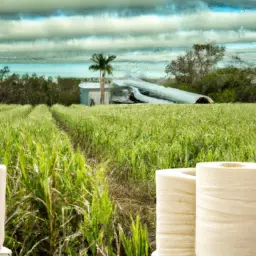
I find sugarcane bagasse toilet paper to be a sustainable and innovative alternative that addresses environmental concerns. Sugarcane bagasse is the fibrous residue left after sugarcane stalks are crushed to extract juice for sugar production. Utilizing bagasse for toilet paper production is a smart move because it reduces waste and makes use of a byproduct that would otherwise be discarded.
Sugarcane bagasse production has several environmental benefits. Firstly, it reduces the need for deforestation and the use of trees for pulp production. This helps preserve our forests and protect biodiversity. Additionally, sugarcane bagasse toilet paper requires less energy and water during manufacturing compared to traditional toilet paper made from virgin wood pulp. This reduces the overall carbon footprint and water consumption associated with the production process.
However, it’s important to consider the environmental impact of sugarcane bagasse production as well. Growing sugarcane requires large amounts of water and fertilizers, which can contribute to water pollution and soil degradation if not properly managed. It’s crucial that sustainable farming practices are implemented to mitigate these potential negative impacts.
Seaweed Toilet Paper

Having heard about the benefits of seaweed toilet paper, I’m intrigued by its potential as an environmentally-friendly alternative.
Seaweed toilet paper production involves using seaweed fibers to create a sustainable and biodegradable product. One of the main advantages of using seaweed toilet paper is its renewable nature. Seaweed is a fast-growing plant that can be harvested and regrown without causing harm to the environment. This makes it a more sustainable option compared to traditional toilet paper made from trees.
Additionally, seaweed toilet paper is naturally antibacterial and hypoallergenic, making it gentle on the skin and suitable for people with sensitive skin or allergies. Moreover, seaweed contains essential minerals and vitamins that can benefit the skin and promote a healthy environment in the bathroom.
Eucalyptus Toilet Paper

One of the benefits of eucalyptus toilet paper is its softness and durability. Eucalyptus trees are known for their fast growth and ability to regenerate quickly, making them a sustainable choice for toilet paper production. The process of eucalyptus fiber production involves harvesting the trees and extracting the fibers from their wood pulp. These fibers are then processed and transformed into soft, strong, and absorbent toilet paper.
Eucalyptus toilet paper offers several advantages over traditional toilet paper options. Firstly, it is more environmentally friendly due to the sustainable nature of eucalyptus trees. Secondly, it provides a luxurious feel, thanks to the softness and gentle texture of the fibers. Lastly, eucalyptus toilet paper is known for its durability, making it less likely to tear or break during use.
To further illustrate the benefits of eucalyptus toilet paper, here is a comparison table:
| Aspect | Eucalyptus Toilet Paper | Traditional Toilet Paper |
|---|---|---|
| Sustainability | Sustainable | Non-sustainable |
| Softness | Soft | Varies |
| Durability | Strong | Varies |
| Environmental Impact | Low | High |
Cotton Toilet Paper Alternatives
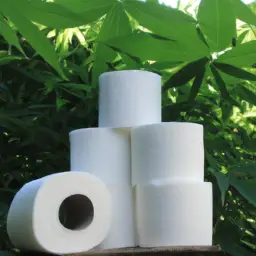
Using cotton toilet paper alternatives can be a sustainable choice for reducing environmental impact. One such alternative is bamboo toilet paper, also known as bamboo tissue. Bamboo is a fast-growing plant that requires less water and no pesticides to grow, making it a more eco-friendly option compared to traditional cotton toilet paper. Additionally, bamboo tissue is biodegradable, meaning it breaks down naturally over time and doesn’t contribute to landfill waste.
Bamboo toilet paper also has other benefits. It’s naturally hypoallergenic and gentle on the skin, making it suitable for those with sensitive skin or allergies. The fibers in bamboo tissue are also naturally stronger and more durable compared to cotton, resulting in a softer and more absorbent product.
Switching to bamboo toilet paper is a simple yet impactful step towards reducing our ecological footprint. By choosing a renewable and sustainable alternative, we can support responsible sourcing practices and help protect our environment.
Conclusion
In conclusion, there are many refreshing alternatives available for environmentally-friendly toilet paper.
From recycled paper products to innovative options like corn husk and seaweed toilet paper, there are plenty of choices to help reduce our impact on the environment.
Bidets and reusable cloth wipes are also great alternatives to consider.
By making small changes in our daily routines, we can contribute to a more sustainable future.
